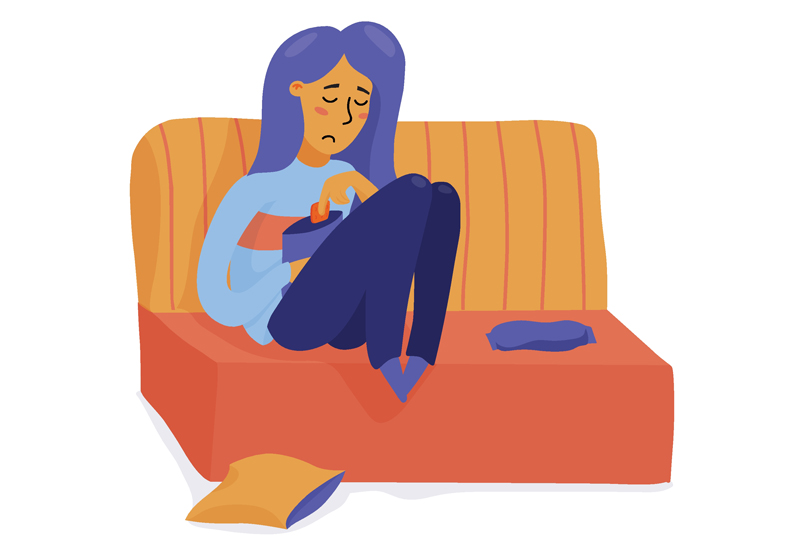If you’ve ever vowed to start eating better, cut out sugar, carbs and anything else under the sun, or completely overhauled your diet, you know that thinking about food can be all-consuming. The planning, the experimenting, the avoiding situations where you don’t trust your own willpower. Breaking bad habits and building a new, healthier routine isn’t easy—and there’s no doubt that your emotions have a huge impact on long-term success.
Have you ever had a particularly bad week at work and said to yourself, I’m going to order a pizza tonight and eat the entire thing because I deserve it. Do you ever rage eat a whole box of cookies after having an argument with your mom? Maybe it’s more of a boredom thing—you can’t possibly binge-watch Netflix without a little junk food to go along with it.
There’s a reason the cliched scene where a girl who was just dumped sobs on the couch with a pint of ice cream persists. Emotional eating is a thing. And we all do it. So how do you break the habit of using food as a crutch to deal with your emotions? It all starts with a change of perspective.
Recognize your triggers
Does work stress always send you straight for the pastries? Is a bad date all it takes to give you uncontrollable cravings for all the carbs? Cheering yourself up with not-so-good-for-you food is to be expected since according to a number of sources, eating sugars and fats releases opioids in your brain. Opioids are the active ingredients in cocaine, heroin, and many other narcotics so the soothing effect you feel from food is a real physical reaction. Breaking your reliance on certain foods as a security blanket or a way to comfort yourself can be like kicking a drug habit.
The first step is identifying the situations that trigger you. It’s not as if you can avoid work stress or ever letting a bad date affect you again but you can decide what cope mechanisms you turn to. Instead of planting yourself on the couch with an entire bag of chips, try calling a friend, going shopping, or reading a book. Consciously replacing a bad habit with a healthier one is a good way to train yourself to be more aware of the times you instinctively turn to food. After awhile, you’ll start noticing that you don’t crave the unhealthy stuff as much because making healthier choices has become a habit.
Plan, plan, plan
Ordering takeout is convenient and easy when you’re busy and/or stressed out all the time. It can be tiring to have to think of something healthy to eat, get to the grocery store and then actually cook for yourself, but if you plan ahead, it doesn’t have to be the pain in the ass you expect it to be. Quite the opposite actually—when you’ve spent the time to plan out healthy meals and made sure to have healthy snacks on hand, you’ll actually think—and feel guilty—about food a lot less. That means more energy to focus on other things.
Be mindful
We should all be eating to live not living to eat, which means the best meals are the ones that fuel your body. Are you eating because you’re hungry or because you’re bored? Even if you aren’t into counting calories, the reality is even the stuff that’s technically healthy like nuts or fruit adds up. Paying attention to what you’re eating as well as how much you’re eating is important. Being mindful also means enjoying your food and when you cut back on added sugar, you’ll notice you enjoy all your food a lot more because it just tastes more flavourful.
Eating a lot of sugar can actually have a negative affect on your brain just as much as your waist line. Elevated glucose levels in the bloodstream can result in slower cognitive function and deficits in memory and attention—not exactly something you want in the middle of a workday. Eating something nutritious on the other hand can keep your emotions level and help you focus. Emotional eating can be a vicious cycle, but being more mindful about how eating something healthy makes you feel might actually help encourage you to keep doing it.
Remember to treat yourself
Just because you’re trying not to let your emotions dictate your food choices doesn’t mean you can never treat yourself anymore. A great time to eat something that may not be considered “healthy” is when you’re celebrating an accomplishment or some other special occasion. The key to treating yourself is to not over indulge. Moderation is the foundation of a healthy lifestyle and a treat here and there is actually good for your mental health. You want a diet that you can maintain, not one that is so strict that you constantly feel deprived.
The important thing to remember is that food can’t make your problems go away. Eating a whole bag of chips in one sitting definitely won’t make you feel better, so do yourself a favour and pour yourself a small bowl to enjoy, but don’t expect food to be a miracle cure to your emotions. Unfortunately, you’ll have to deal with those by actually facing them.












